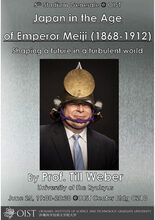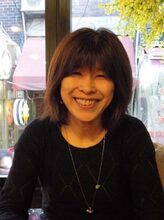Past Events
"Mechanisms of cross-modal transfer for cerebellar associative learning" by Merit Kruse
2025-11-19A talk by Merit Kruse
Megan Carey Lab, Champalimaud Centre for the Unknown, Lisbon, Portugal
(Room changed to C209) Japan in the Age of Emperor Meiji (1868-1912) – Shaping a future in a turbulent world
2025-06-25Japan in the Age of Emperor Meiji (1868-1912) – Shaping a future in a turbulent world
OIST Computational Neuroscience Course (OCNC 2025)
2025-06-23 to 2025-07-10OIST Workshop | Website | Main organizer: Erik De Schutter (Computational Neuroscience Unit) | OIST members are welcome to attend all scientific sessions. Tutorial sessions and meals are closed sessions (for registered participants only).
Dr. Kim Palacios-Flores "DYNAMIC COGNITIVE REPRESENTATIONS IN THE ADULT ZEBRAFISH TELENCEPHALON"
2025-04-22A talk by Dr. Kim Palacios-Flores
Postdoctoral Researcher at Friedrich Miescher Institute for Biomedical Research, Basel, Switzerland
[Cancelled] Coupled inverse and forward models in the cerebellum
2025-03-19<Due to changing of flight schedule, this seminor got cancelled.>
Speaker: Javier Francisco MedinaProfessor & Brown Foundation Chair in Neuroscience
Department of Neuroscience
Baylor College of Medicine
4th Studium Generale by Prof. Till Weber (The University of the Ryukyus)
2024-12-114th Studium Generale by Prof. Till Weber (The University of the Ryukyus)
From Bakumatsu to Meiji – How Japan came into the modern age, 1850´s to 1870´s
A Talk by Keiko Yamamoto: Cerebellar non-motor functions: brain development and mental control
2024-11-28Speaker : Keiko Yamamoto (Korea Institute of Science and Technology: Networks, synaptic regulations, and functions in the cerebellum)
A Talk by Devika Narain : Prior beliefs about time: From single cells to neural manifolds
2024-11-28Speaker :Devika Narain (Erasmus Medical Center, Circuit dynamics of temporal control)
OIST Workshop "Principles of Synapse Organization and Neural Network Regulation Gained Through Evolution"
2024-11-05 to 2024-11-07OIST Workshop | Main organizer: Yukiko Goda (Synapse Biology Unit) | OIST members are welcome to attend all scientific sessions. Meals are closed sessions for registered participants only.
A Talk by Risa Iguchi : Impact of social isolation on neuronal circuit development: interpretation for future perspective of cross talk at synaptic local environment in stress resilience
2024-07-29Speaker : Dr. Risa Iguchi (King's College London)













